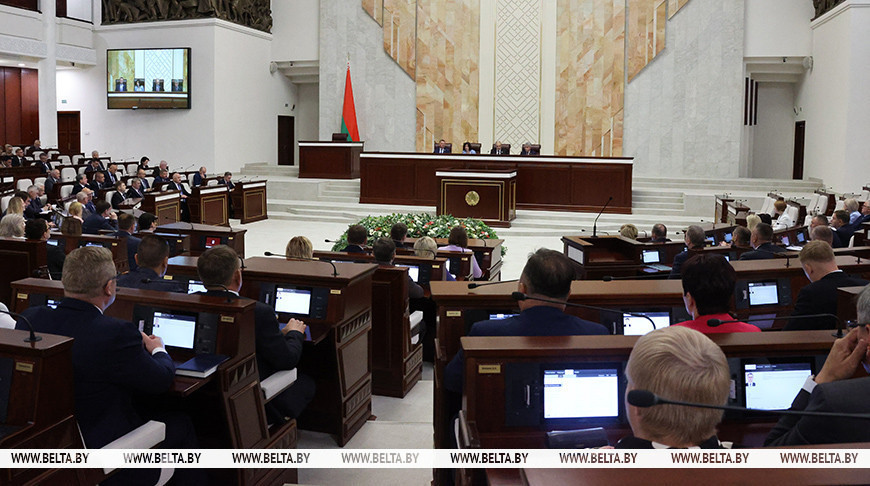
MINSK, 20 June (BelTA) – The tasks laid out in the Monetary Policy Guidelines have been fulfilled in full, Chairman of the Board of the National Bank Pavel Kallaur said at a joint meeting of the House of Representatives and the Council of the Republic on 20 June, BelTA has learned.
“The National Bank, like any other economic institution, works to achieve the key goal of the country’s socio-economic development - ensuring incremental improvement of living standards and the quality of life of people. The National Bank has contributed to achieving this goal by creating the necessary conditions for economic growth,” said Pavel Kallaur.
He outlined the main areas of work of the National Bank. “The first one is ensuring price and financial stability. This way the National Bank maintains macroeconomic stability and balance, which is essential for preserving the purchasing power of household incomes, creating stable and predictable conditions for planning business operations. Our second area of work is creating a transparent and comfortable business environment and offering effective mechanisms for transforming savings into investments and for rational distribution of financial resources in the economy. Third, we work to increase social standards and improve protection of people in the financial sector,” the chairman of the board of the National Bank said.
He noted that the coordinated actions of the National Bank and the Government of Belarus helped keep inflation within the planned range. “In 2023 consumer prices rose by 5.8%; the target was to keep the price rise under 7-8%. At the same time, prices and tariffs that are taken into account while calculating core inflation increased by 3.8% over the year. This indicator does not include the dynamics of prices and tariffs set by the government, as well as changes in prices for seasonal goods. Taking into account the macroeconomic situation, the National Bank had to temporarily move away from standard approaches to the monetary policy. The regulation of the monetary sector was multi-tier. Prompt use of non-standard instruments and tools, along with classic ones, allowed easing the pressure of inflationary factors and responding more efficiently to external challenges,” said Pavel Kallaur.
The slowdown in inflation was also attributed to the price regulation system introduced by Belarus’ government (Resolution No. 713 as of 19 October 2022). It limited the inclusion of unreasonably inflated risks and costs in price calculations.
“It is noteworthy that monetary conditions were maintained at a fairly moderate level, which helped introduce incentives for reinvigorating business activity and adjusting the economy to unfavorable market changes,” Pavel Kallaur noted.
The implementation of this monetary policy continues throughout 2024. The annualized increase in consumer prices in May 2024 amounted to 5.7%, core inflation was estimated at 4.5%.
“The timely and comprehensive measures to limit systemic risks and mitigate the influence of negative factors made it possible to ensure financial stability and helped minimize the negative impact of economic sanctions. This helped ensure sustainable operation of the financial and payment markets, as well as its participants. At the end of 2023, all banks were able to meet safe operation standards. Indicators characterizing risk and sustainability of non-credit financial institutions also remained at an acceptable level. Continuity of payments, reliable functioning of software and hardware systems and information security in payment systems were ensured,” Pavel Kallaur added.
“The National Bank, like any other economic institution, works to achieve the key goal of the country’s socio-economic development - ensuring incremental improvement of living standards and the quality of life of people. The National Bank has contributed to achieving this goal by creating the necessary conditions for economic growth,” said Pavel Kallaur.
He outlined the main areas of work of the National Bank. “The first one is ensuring price and financial stability. This way the National Bank maintains macroeconomic stability and balance, which is essential for preserving the purchasing power of household incomes, creating stable and predictable conditions for planning business operations. Our second area of work is creating a transparent and comfortable business environment and offering effective mechanisms for transforming savings into investments and for rational distribution of financial resources in the economy. Third, we work to increase social standards and improve protection of people in the financial sector,” the chairman of the board of the National Bank said.
He noted that the coordinated actions of the National Bank and the Government of Belarus helped keep inflation within the planned range. “In 2023 consumer prices rose by 5.8%; the target was to keep the price rise under 7-8%. At the same time, prices and tariffs that are taken into account while calculating core inflation increased by 3.8% over the year. This indicator does not include the dynamics of prices and tariffs set by the government, as well as changes in prices for seasonal goods. Taking into account the macroeconomic situation, the National Bank had to temporarily move away from standard approaches to the monetary policy. The regulation of the monetary sector was multi-tier. Prompt use of non-standard instruments and tools, along with classic ones, allowed easing the pressure of inflationary factors and responding more efficiently to external challenges,” said Pavel Kallaur.
The slowdown in inflation was also attributed to the price regulation system introduced by Belarus’ government (Resolution No. 713 as of 19 October 2022). It limited the inclusion of unreasonably inflated risks and costs in price calculations.
“It is noteworthy that monetary conditions were maintained at a fairly moderate level, which helped introduce incentives for reinvigorating business activity and adjusting the economy to unfavorable market changes,” Pavel Kallaur noted.
The implementation of this monetary policy continues throughout 2024. The annualized increase in consumer prices in May 2024 amounted to 5.7%, core inflation was estimated at 4.5%.
“The timely and comprehensive measures to limit systemic risks and mitigate the influence of negative factors made it possible to ensure financial stability and helped minimize the negative impact of economic sanctions. This helped ensure sustainable operation of the financial and payment markets, as well as its participants. At the end of 2023, all banks were able to meet safe operation standards. Indicators characterizing risk and sustainability of non-credit financial institutions also remained at an acceptable level. Continuity of payments, reliable functioning of software and hardware systems and information security in payment systems were ensured,” Pavel Kallaur added.













